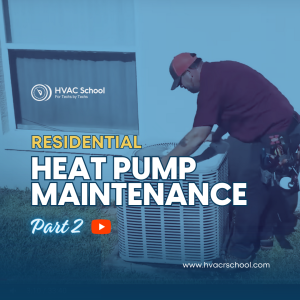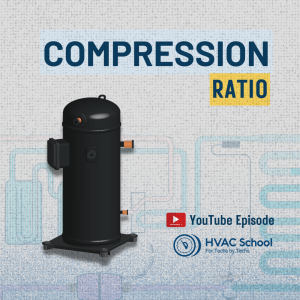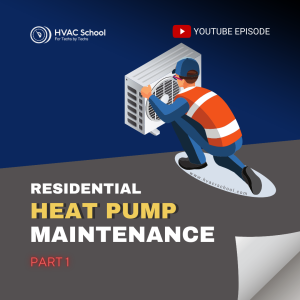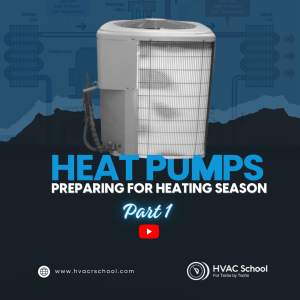BACK
 Upgrading Time & Temperature Defrost with Demand Defrost for Heat Pumps
Upgrading Time & Temperature Defrost with Demand Defrost for Heat Pumps
 Coil Temp Sensors: Thermostats vs. Thermistors
Coil Temp Sensors: Thermostats vs. Thermistors
 Design and Performance Challenges of Air-Source Heat Pumps Across Diverse Climatic Conditions
Design and Performance Challenges of Air-Source Heat Pumps Across Diverse Climatic Conditions
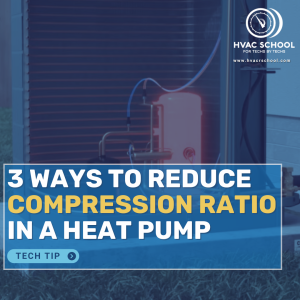 3 Ways to Reduce Compression Ratio in a Heat Pump
3 Ways to Reduce Compression Ratio in a Heat Pump
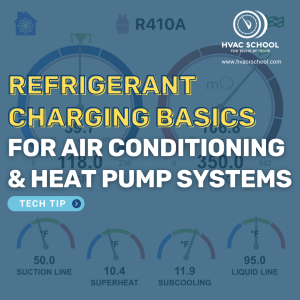 Refrigerant Charging Basics For Air Conditioning & Heat Pump Systems
Refrigerant Charging Basics For Air Conditioning & Heat Pump Systems
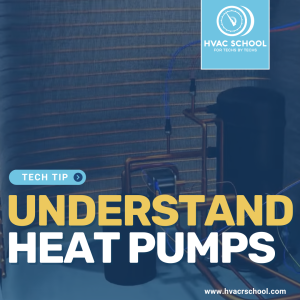 Understand Heat Pumps
Understand Heat Pumps
 Heat Pump Defrost Troubleshooting Tips
Heat Pump Defrost Troubleshooting Tips
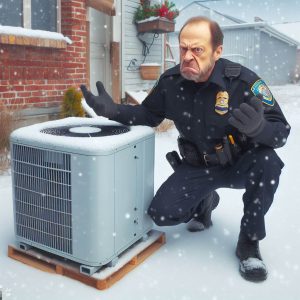 Good COP – Bad COP
Good COP – Bad COP
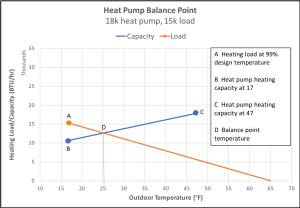 Thermal Balance Point
Thermal Balance Point
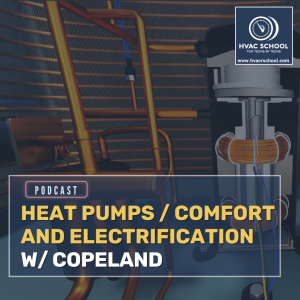 Heat Pumps / Comfort and Electrification w/ Copeland
Heat Pumps / Comfort and Electrification w/ Copeland
 How to Predict Air Flow Issues in the Sales Process
How to Predict Air Flow Issues in the Sales Process
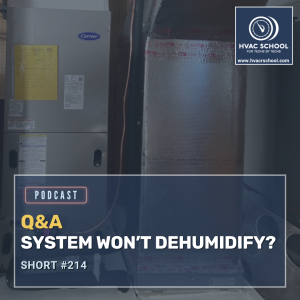 Q&A – System Won’t Dehumidify? – Short #214
Q&A – System Won’t Dehumidify? – Short #214
 Heat Pump COP and Low Temp Lock Out
Heat Pump COP and Low Temp Lock Out
 When to Switch to Emergency Heat? – Short #190
When to Switch to Emergency Heat? – Short #190
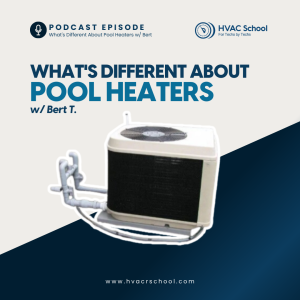 What’s Different About Pool Heaters w/ Bert
What’s Different About Pool Heaters w/ Bert
 Checking a Heat Pump in Heat Mode – Short #178
Checking a Heat Pump in Heat Mode – Short #178
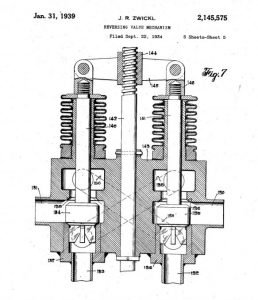 Heat Pumps, Reversing Valves, and Defrost Podcast
Heat Pumps, Reversing Valves, and Defrost Podcast
 The Great Heat Pump Revolt of 2026 and How to Avoid It
The Great Heat Pump Revolt of 2026 and How to Avoid It
 Electrification in HVAC: An Update
Electrification in HVAC: An Update
 Understanding Dual Fuel
Understanding Dual Fuel
#heat pump
Tech Tips:

Since heat pumps work by extracting heat from the outdoors to bring it inside, the outdoor coil will almost surely freeze up. To mitigate the freezing, heat pumps enter a defrost cycle in which they run in cooling mode to send hot, high-pressure refrigerant back through the outdoor coil and melt the ice. While the […]
Read more

‘Tis heating season once again. It’s getting colder outside, and the heat pumps are starting to frost up outdoors. The defrost cycle helps get rid of the frost, and there are a few different ways we can do that; the methods themselves may differ between systems (time & temperature vs. demand defrost), as may the […]
Read more

This tech tip was inspired by Alex Meaney and Ed Janowiak’s session at NCI’s High-Performance Summit 2025: “Good Design Isn’t a Buffet: The Importance and Interconnection of Manuals J, S, and D.” Alex is a building science expert who worked at Wrightsoft (now MiTek) for several years before launching his consulting firm, Mean HVAC Consulting […]
Read more

We’ve talked about compression ratio a lot over the years. Compression ratio is the number you get when you divide the absolute head pressure (PSIG + 14.7) by the absolute suction pressure (PSIG + 14.7). It measures the efficiency of a compressor, and lower numbers indicate that the compressor is moving more refrigerant while consuming […]
Read more

Before I start on this one… At HVAC School, we focus on a wide range of topics. Many of them are very basic. My experience as a trainer for over 20 years has taught me that no matter what I assume others SHOULD know, it doesn't change the fact that they often do not. This […]
Read more

My goal in this tech tip is to help those who struggle to understand heat pumps get their heads around them as quickly as possible and understand some of the things a tech needs to know about them. The basic idea of a heat pump is to use the compression refrigeration cycle to move heat […]
Read more

We’ve entered that season of service calls for “smoking heat pumps,” and I figured now is as good a time as any to share a few quick tips for troubleshooting defrost. Of course, the “smoking heat pump” calls can be solved over the phone with a quick explanation of normal defrost conditions—as can the service […]
Read more

There has been a lot of advice being tossed around by contractors and builders about the best time to use the emergency heat feature on an all-electric heat pump system. The answer is never! That was easy. Next article… In all seriousness, “Emergency Heat” should be used as described, ONLY during an emergency. I guess I should […]
Read more

Thermal balance point is a concept that is going to start mattering a lot more in years to come as more and more homeowners become interested in electrification. In almost all cases, the heat load for a house is larger than the cooling load; this is true even where I live in Dallas, Texas. Why […]
Read more
Videos:
Podcasts:

In this informative episode, Josh Souders from Copeland joins Bryan to dive deep into heat pump technology, discussing everything from basic operations to advanced features in cold climate applications. The conversation begins with a fundamental explanation of how heat pumps work, describing them as essentially air conditioners with a reversing valve that allows them […]
Read more

Chris Hughes and Steve Rogers from The Energy Conservatory discuss TEC's TrueFlow technology and its crucial role in predicting airflow issues in the sales process, particularly for heat pump retrofits. They explain how the TrueFlow app helps contractors accurately measure both static pressure and airflow in existing systems, enabling them to predict whether proposed […]
Read more

In this short podcast episode, Bryan answers a listener-submitted question about an HVAC system that won't dehumidify. This question was submitted by a homeowner with a Carrier heat pump with an attic air handler that cools but won't dehumidify on the hottest days of summer. One of the past companies that serviced the system […]
Read more

This episode of the HVAC School Live Stream covers the key concepts around heat pump efficiency and understanding the coefficient of performance (COP). Eric Kaiser from TruTech Tools and Jim Fultz from White-Rodgers provide valuable insights into how heat pumps operate and how to optimize their performance, especially in colder weather conditions. The discussion […]
Read more

In this short podcast episode, Bryan talks about when to switch to emergency heat. He talks about coefficient of performance (COP) and how it's a deciding factor when to run emergency heat, which is when a system ONLY runs the backup heat; it doesn't use it as supplementary heat. When we have a heat […]
Read more

In this podcast, Bryan Orr and Bert discuss various aspects of pool heaters, focusing on issues that make them different from typical HVAC systems. They cover the basics of pool heaters – the main types (heat pumps and gas heaters) and how they operate similarly or differently from things HVAC techs work on regularly. […]
Read more

In this short podcast, Bryan talks about checking the charge of a heat pump in heat mode. This skill will become more critical as ambient temperatures get cooler. The most reliable way to check and set the charge regardless of operating mode and season is to weigh the charge. This method is most practical […]
Read more

In this episode of HVAC School, Bryan covers the basics of heat pumps. Heat pumps are common technologies in Florida. They reverse the sequence of the typical refrigerant circuit: the indoor coil can become the condenser, and the outdoor coil can become the evaporator. Heat pumps can achieve that transition via a reversing valve, which […]
Read more
Events:

NOTE: If you cannot view the recording, the video may still be processing. The maximum wait time is 24 hours. We apologize for the delay and appreciate your patience.
Read more

NOTE: If you cannot view the recording, the video may still be processing. The maximum wait time is 24 hours. We apologize for the delay and appreciate your patience.
Read more

NOTE: If you cannot view the recording, the video may still be processing. The maximum wait time is 24 hours. We apologize for the delay and appreciate your patience.
Read more



